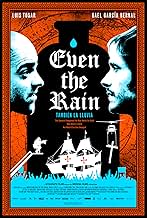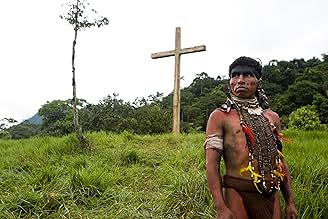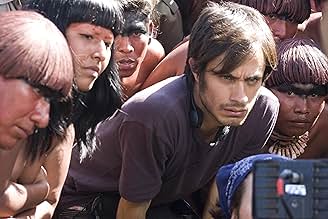As a director and his crew shoot a controversial film about Christopher Columbus in Cochabamba, Bolivia, local people rise up against plans to privatize the water supply.As a director and his crew shoot a controversial film about Christopher Columbus in Cochabamba, Bolivia, local people rise up against plans to privatize the water supply.As a director and his crew shoot a controversial film about Christopher Columbus in Cochabamba, Bolivia, local people rise up against plans to privatize the water supply.
- Awards
- 22 wins & 17 nominations total
- Director
- Writer
- All cast & crew
- Production, box office & more at IMDbPro
7.415.3K
1
2
3
4
5
6
7
8
9
10
Featured reviews
A model involved movie
It would not be surprising if some day a film school professor chose 'También la lluvia' to illustrate a course about committed pictures, for this Spanish-Mexican co-production is indeed a model of its kind.
Intelligently written by Paul Laverty (Ken Loach's regular collaborator since 1996) and competently helmed by Icíar Bollaín (a Spanish actress turned director and, incidentally, Laverty's life companion), 'También la lluvia' examines a social and political event that took place in Bolivia in 2000, the Water War, when an American Water Company tried to privatize the drinking water service in the town of Corachamba, implying a tariff raise in an order from 40% to 300%.
To tell his story, the writer could have adopted the committed filmmaker's standard approach: «display of injustice/negative impact on the group concerned/reaction of the most militant/confrontation/resolution of the conflict». Instead, he imagined the coming of a film crew shooting a movie in the surroundings of Carachambo, getting involved gradually– and against their will - in the troubles affecting Corachamba. So do the viewers, who identify with them without having the feeling they are being manipulated by the authors.
Such a concept also gives 'También la lluvia' added value, making it function on several levels. It enables Laverty to: - inform his audiences about a little known historical event - unveil a hidden chapter of history (through the subject of the film shot within the film: the first opponents to the Conquistadores, Jesuits Bartolomé de las Casas and Antonio de Montesinos) - have the two stories echo each other and enrich each other - cast a spotlight on Bolivia, a neglected country, and on its Indian population - depict complex characters (the more idealistic ones shying away from direct action when confronted to danger while the more reactionary display unexpected bravery)
Helped by Iciar Bollain's sure-handed direction and by the excellence of the cast (Gabriel Garcia Bernal as Sébastián, the tormented director ; Luis Tosar as the cynical producer ; Karra Elejalde, impressive as the provocative star of the film in progress ; and - the revelation of the film, - the amazing Juan Carlos Aduviri, who inhabits his role as the Indian actor/activist Daniel), Paul Laverty manages to teach, move and entertain, while avoiding dogmatism, bias and over-simplification. Just what he is accused of by the flock of bleating French film critics.
Intelligently written by Paul Laverty (Ken Loach's regular collaborator since 1996) and competently helmed by Icíar Bollaín (a Spanish actress turned director and, incidentally, Laverty's life companion), 'También la lluvia' examines a social and political event that took place in Bolivia in 2000, the Water War, when an American Water Company tried to privatize the drinking water service in the town of Corachamba, implying a tariff raise in an order from 40% to 300%.
To tell his story, the writer could have adopted the committed filmmaker's standard approach: «display of injustice/negative impact on the group concerned/reaction of the most militant/confrontation/resolution of the conflict». Instead, he imagined the coming of a film crew shooting a movie in the surroundings of Carachambo, getting involved gradually– and against their will - in the troubles affecting Corachamba. So do the viewers, who identify with them without having the feeling they are being manipulated by the authors.
Such a concept also gives 'También la lluvia' added value, making it function on several levels. It enables Laverty to: - inform his audiences about a little known historical event - unveil a hidden chapter of history (through the subject of the film shot within the film: the first opponents to the Conquistadores, Jesuits Bartolomé de las Casas and Antonio de Montesinos) - have the two stories echo each other and enrich each other - cast a spotlight on Bolivia, a neglected country, and on its Indian population - depict complex characters (the more idealistic ones shying away from direct action when confronted to danger while the more reactionary display unexpected bravery)
Helped by Iciar Bollain's sure-handed direction and by the excellence of the cast (Gabriel Garcia Bernal as Sébastián, the tormented director ; Luis Tosar as the cynical producer ; Karra Elejalde, impressive as the provocative star of the film in progress ; and - the revelation of the film, - the amazing Juan Carlos Aduviri, who inhabits his role as the Indian actor/activist Daniel), Paul Laverty manages to teach, move and entertain, while avoiding dogmatism, bias and over-simplification. Just what he is accused of by the flock of bleating French film critics.
Movie within a movie, and parallels from Columbus to modern Bolivia
Even the Rain (2010)
There are so many stunning, powerful, dramatic, believable moments to this hard hitting film, you wish so much that there weren't a few unreasonable gaffes to the plot and characters. It's frustrating when a film is almost amazing, because you are reminded of what it was not.
But also what it is, which is pretty thrilling and clever.
First, the contemporary setting is based quite closely on the true events of local Bolivians in the third largest city of the country, Cochabamba, fighting for rights to their own water supply. A private (Euro-U.S.) firm has cornered water rights and when the locals try to use their own handmade supply system the police come and interfere. It's maddening to the point of anger on both sides of the screen. In a way, this local uprising against injustice is the movie, the core of the events.
But what makes it actually fabulous is the way it told through the eyes and cameras of a large film crew working on a movie about Christopher Columbus arriving on the shores of America and mistreating the natives. Yes, a parallel that is obvious but handled with dramatic aplomb. There are many moments showing the shooting of the film, and it transports the viewer instantly and beautifully to the Columbus events, which are epic in their own way. But the characters are part professional actors from other countries and part local (and underpaid) extras, some of whom are involved in the water protests when not filming.
So there are several layers of action, tightly interwoven. The disdain and fear of some of the outsiders is believable (the man playing Columbus, Karra Elejalde, is amazing, world weary and tough, taking both sides as needed). Some of the circa 1500 history of resistance by the natives and even the brave defense of the natives by a Spanish priest is inspiring. And the way it still applies 500 years later (500 years!) is depressing. And energizing.
There are some other small problems, maybe the result of editing down too much later, such as the inclusion at the start of black and white video footage, a documentation of the filming, that you think will then become news footage (or not) but then it just disappears as a component of the film, completely, for no reason. And then the tumult of the last half hour with riots and roadblocks is great stuff, really well done, but so highly improbable you have to just write it off to generous screen writing. We aren't really able to believe the wholehearted change of attitude of the producer (played with intensity by Luis Tosar), but it makes for great interpersonal (and sympathetic) dramatics. And finally the director of the movie within the movie is played by the ever beautiful Gael Garcia Bernal, but in fact he's too weak and thoughtful a type to be directing this sprawling and frankly unmanageable movie about Columbus.
But these objections actually only came up for me later, thinking back. While immersed, I was really immersed and impressed. It's an ambitious, smart, and pertinent movie, with great and enjoyable complexity.
There are so many stunning, powerful, dramatic, believable moments to this hard hitting film, you wish so much that there weren't a few unreasonable gaffes to the plot and characters. It's frustrating when a film is almost amazing, because you are reminded of what it was not.
But also what it is, which is pretty thrilling and clever.
First, the contemporary setting is based quite closely on the true events of local Bolivians in the third largest city of the country, Cochabamba, fighting for rights to their own water supply. A private (Euro-U.S.) firm has cornered water rights and when the locals try to use their own handmade supply system the police come and interfere. It's maddening to the point of anger on both sides of the screen. In a way, this local uprising against injustice is the movie, the core of the events.
But what makes it actually fabulous is the way it told through the eyes and cameras of a large film crew working on a movie about Christopher Columbus arriving on the shores of America and mistreating the natives. Yes, a parallel that is obvious but handled with dramatic aplomb. There are many moments showing the shooting of the film, and it transports the viewer instantly and beautifully to the Columbus events, which are epic in their own way. But the characters are part professional actors from other countries and part local (and underpaid) extras, some of whom are involved in the water protests when not filming.
So there are several layers of action, tightly interwoven. The disdain and fear of some of the outsiders is believable (the man playing Columbus, Karra Elejalde, is amazing, world weary and tough, taking both sides as needed). Some of the circa 1500 history of resistance by the natives and even the brave defense of the natives by a Spanish priest is inspiring. And the way it still applies 500 years later (500 years!) is depressing. And energizing.
There are some other small problems, maybe the result of editing down too much later, such as the inclusion at the start of black and white video footage, a documentation of the filming, that you think will then become news footage (or not) but then it just disappears as a component of the film, completely, for no reason. And then the tumult of the last half hour with riots and roadblocks is great stuff, really well done, but so highly improbable you have to just write it off to generous screen writing. We aren't really able to believe the wholehearted change of attitude of the producer (played with intensity by Luis Tosar), but it makes for great interpersonal (and sympathetic) dramatics. And finally the director of the movie within the movie is played by the ever beautiful Gael Garcia Bernal, but in fact he's too weak and thoughtful a type to be directing this sprawling and frankly unmanageable movie about Columbus.
But these objections actually only came up for me later, thinking back. While immersed, I was really immersed and impressed. It's an ambitious, smart, and pertinent movie, with great and enjoyable complexity.
Poignant...
I found it very easy to identify with all of the main players thanks to some great performances from all involved and also a really nicely written script. It's really well shot with nice big, easily legible subtitles (more like this please foreign filmmakers!). It was interesting to see a film set in that region, we don't see very much from that part of the world. There are also some historical facts about the conquistadors that I wasn't aware of and so it even educated be a little! I love the way it slowly dawns on the crew that the mistakes made 500 years previously are still being made today! Over all, I found it well worth a look and it's one I would certainly look at again sometime.
SteelMonster's verdict: RECOMMENDED
My score: 8.3/10
You can find an expanded version of this review on my blog: Thoughts of a SteelMonster.
SteelMonster's verdict: RECOMMENDED
My score: 8.3/10
You can find an expanded version of this review on my blog: Thoughts of a SteelMonster.
Whitey On The Moon
EVEN THE RAIN, directed by Icíar Bollaín, is a compelling film which attempts to explore the history of global economics using a kind of cinematic metaphor. Bollain's film focuses on a multinational movie crew that travels to Bolivia to make a film about Christopher Columbus, and examines his agenda of religious, cultural, and monetary exploitation of The New World. The production company hits a snag when locally violent demonstrations breakout against corporate ownership of indigenous water rights, and threaten to make the completion of the film impossible. The movie shows that the issues of wealth, ownership, and power are just as contentious today as they were five hundred years ago. Corporate giants of our era employ the same greedy strategy in an attempt to steal wealth, power, and access from the uninformed and defenseless. Although the ethical issues in the film are sometimes presented in a slightly heavy-handed manner, by the end of the feature, it is evident that the application of rapacious economic policy hasn't changed much since monarchs ruled the world.
Contemporary Conquistadores: Gold Equals Water
EVEN THE RAIN (También la lluvia) is a brilliant metaphor of a story written by Paul Laverty based on an actual event and directed with considerable skill by Icíar Bollaín, the great Spanish actress, writer and director. This film is one of those rare 'docudramas' that bring to light historical 'secrets' that beg to be shared. In 2000 an American water company bought the water supply from the Bolivian government and the citizens of Bolivia were banned from collecting rainwater which had become corporate property. This resulted in a violent protest against the government by the indigenous Indians and the citizenry of Cochambamba, Bolivia who claimed their rights to the natural gifts of nature - even the rain. Laverty and Bollaín expose this injustice through a well-conceived story within a story.
Spanish film director Sebastián (Gael García Bernal), his cynical producer Costa (Luis Tosar), and crew including Antón (Karra Elejalde) have come to Cochabamba, Bolivia to shoot their film about Christopher Columbus (played by actor Antón - Karra Elejalde) and his first explorations, revealing the way the Spaniards treated the native Indians: Costa has chosen the place because he can get cheap labor in using local actors and extras to keep within the small budget of the film. Sebastián is the compassionate one who wants the Indians treated well, hiring a mouthy young Indian named Hatuey/Daniel (Juan Carlos Aduviri) when he claims he and his family are being unjustly overlooked as actor candidates. The filming goes well, with the exception of some minor glitches for particular scenes the Indians find too dangerous, until a conflict develops over the governmental privatization of the water supply. Daniel becomes an activist against the government who plan a 300% increase in price of water - the average daily income for the Indians is $2. a day! - and the conditions in the city become unfriendly for the film to continue. Bloody violence and chaos breakout and many citizens are being killed or jailed. It is at this point that the caring Sebastián finally decides that he and his crew must flee, and with some role reversal, Costa stays behind to protect Daniel's family.
According to Bollaín, 'It was the gold 500 years ago, and now it's the water, which is the gold of the 21st century. Before it was the Crown of Spain and the pope who approved the conquest. Now it is the new theologians, the IMF and the World Bank. Again it's the word from above, saying, 'This is right.' The Spanish filmmakers in the film-within-a-film are caught in the middle. They have the attitude of neo-conquerors - they go there because it's cheap. But they're also trying to make a film that casts a different look on the conquest. And it's an adventure.'
Iciar Bollaín directs this epic film with great dignity and with a keen observation of how history, even inadvertently, repeats itself. The cinematography by Alex Catalán and the musical score by Alberto Iglesias add immeasurably to the film's success. The cast of extras is exceptional and very well directed. Both Gael García Bernal and Luis Tosar deliver intensely considered performances as does Juan Carlos Aduviri as the key central figure Daniel. Hopefully this film, nominated for Best Foreign Film in the 2010 Academy Awards. In Spanish with English subtitles.
Grady Harp
Spanish film director Sebastián (Gael García Bernal), his cynical producer Costa (Luis Tosar), and crew including Antón (Karra Elejalde) have come to Cochabamba, Bolivia to shoot their film about Christopher Columbus (played by actor Antón - Karra Elejalde) and his first explorations, revealing the way the Spaniards treated the native Indians: Costa has chosen the place because he can get cheap labor in using local actors and extras to keep within the small budget of the film. Sebastián is the compassionate one who wants the Indians treated well, hiring a mouthy young Indian named Hatuey/Daniel (Juan Carlos Aduviri) when he claims he and his family are being unjustly overlooked as actor candidates. The filming goes well, with the exception of some minor glitches for particular scenes the Indians find too dangerous, until a conflict develops over the governmental privatization of the water supply. Daniel becomes an activist against the government who plan a 300% increase in price of water - the average daily income for the Indians is $2. a day! - and the conditions in the city become unfriendly for the film to continue. Bloody violence and chaos breakout and many citizens are being killed or jailed. It is at this point that the caring Sebastián finally decides that he and his crew must flee, and with some role reversal, Costa stays behind to protect Daniel's family.
According to Bollaín, 'It was the gold 500 years ago, and now it's the water, which is the gold of the 21st century. Before it was the Crown of Spain and the pope who approved the conquest. Now it is the new theologians, the IMF and the World Bank. Again it's the word from above, saying, 'This is right.' The Spanish filmmakers in the film-within-a-film are caught in the middle. They have the attitude of neo-conquerors - they go there because it's cheap. But they're also trying to make a film that casts a different look on the conquest. And it's an adventure.'
Iciar Bollaín directs this epic film with great dignity and with a keen observation of how history, even inadvertently, repeats itself. The cinematography by Alex Catalán and the musical score by Alberto Iglesias add immeasurably to the film's success. The cast of extras is exceptional and very well directed. Both Gael García Bernal and Luis Tosar deliver intensely considered performances as does Juan Carlos Aduviri as the key central figure Daniel. Hopefully this film, nominated for Best Foreign Film in the 2010 Academy Awards. In Spanish with English subtitles.
Grady Harp
Did you know
- TriviaThe scene where the little girl sees herself on screen was kind of a self homage by director/actress Icíar Bollaín. She wanted to transmit her first impression when she saw herself on screen being a teenager.
- ConnectionsFeatured in Ebert Presents: At the Movies: Episode #1.6 (2011)
- How long is Even the Rain?Powered by Alexa
Details
Box office
- Gross US & Canada
- $518,017
- Opening weekend US & Canada
- $53,730
- Feb 20, 2011
- Gross worldwide
- $7,313,485
- Runtime
- 1h 43m(103 min)
- Color
- Sound mix
- Aspect ratio
- 2.35 : 1
Contribute to this page
Suggest an edit or add missing content
































